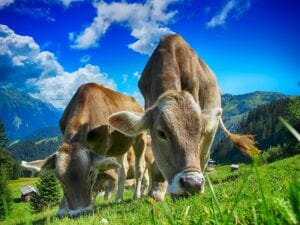Recently, MSD Animal Health released a report detailing the factors that contribute to a sustainable livestock business. And while the document contained some of the stipulations you might expect, it also included exciting ideas for how animal agriculture businesses can improve their practices further.
Typically, the word sustainability means doing things in a more expensive way to save the environment and protect animal health. But the report points out that this isn’t the case – quite the reverse. Livestock businesses, it says, can expect to increase productivity and welfare, all while adopting eco-conscious methods.
Healthy Animals Produce Higher Quality Food Products

Modern consumer tastes are changing. People no longer want to buy plastic-wrapped packets of low-welfare meat products. Instead, they’re looking for assurances from producers that the food they’re getting is sustainably sourced.
What’s more, the vast majority of customers are prepared to pay more if they know that the meat or eggs are from a reputable source.
Livestock businesses, therefore, should take note. Consumers are prepared to pay higher prices, which, in turn, raises the value of each head of cattle you rear.
Healthy Animals Increase Productivity
Productivity in animal agriculture is vital if it is going to become more sustainable and affordable. Unfortunately, the industry is still some way off from its potential, due primarily to animal health problems.
The MSD report estimated that the world loses around 20 percent of all animals every year to diseases associated with intensive farming methods and poor feeding practices.
Sick animals also produced less meat and milk than their healthy counterparts, further eating into productivity.
Part of the solution, therefore, is to improve the quality of feed. You can learn more here about the specifics. Primarily, it has to do with providing the correct nutrients at the right time to maximize production.
Healthy Animals Support A Better Environment
The livestock industry knows that if it wants to thrive long-term, it needs to adopt strategies to reduce its environmental impact. Consumers are becoming increasingly aware of the role of the sector in climate change. And that may force a change in their spending habits in the coming years.
It is clear, regardless of the production system, that animal health is crucial for continued economic viability. Put simply: animals that grow faster need fewer resources to sustain them along the way. They use fewer fossil fuels, land, and water than their sickly counterparts.
If you run a livestock business, then sustainability is no longer something you can ignore. It is the ticket you need to future-proof your enterprise and mitigate against the impact of things like climate change.
Remember, the sector is likely to face severe problems in the future. Scientists report that the number of hot, long, dry summers is going to increase and that you may face more extreme weather events.
The beef trade is also going to have to cut back on the practice of using young mothers to raise fresh calves. The evidence suggests that this is a wasteful practice and doesn’t save money.
